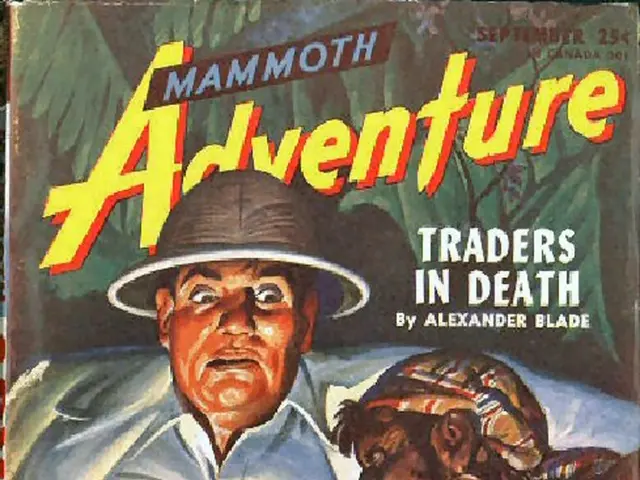Rockin' It Out from the Motor City - Bob Seger at 80!
Eighty years of gritty rock 'n' roll from Motor City: Bob Seger reaches milestone birthday - Motor City delivers a raw stone, as Bob Seger, the highly-regarded rocker, reaches the venerable age of 80.
Let's get down to it - Bob Seger's raw, gritty sound echoes the no-nonsense vibe of his hometown Detroit, just as honestly as his lyrics belt out the everyday struggles and triumphs of the working class. Known as one of the most influential voices in American heartland rock, this badass rockstar, Robert Clark Seger, turns 80 today (May 6).
For nearly six decades, Seger's musical journey has been a ride through the power of industrial halls and the grit of the little guy. Yet, the man could also soften things up when it came to mainstream hits, balancing his rebel image with commercial success.
Escape through Music
Born to an alcoholic nurse and an amateur musician dad, Seger found solace in music after his parents split when he was just ten. By the early '60s, he fronted his first band, The Decibels. In the years that followed, Seger and his subsequent group, The Last Heard, lit up the local scene. In 1968, he landed a hit that beat out the Beatles on the US charts.
Seger hit his creative high in the mid-'70s when he formed the Silver Bullet Band. His 1976 live album "Live Bullet" skyrocketed him to national fame, staying in the charts for over 140 weeks. With 20 albums under his belt and over 50 million copies sold, Seger's tunes have earned more than ten platinum certifications. His latest studio album, "I Knew You When," dropped in 2017.
Paving the Way for Legends
Seger's impact on the music world runs even deeper than his discography suggests. He's considered the trailblazer for artists such as the Eagles, John Cougar Mellencamp, Bruce Springsteen, Jackson Browne, and Tom Petty. Seger was the first rock musician to release a song opposing the Vietnam War, and his songs could often be heard in Hollywood hits like "Urban Cowboy," "Risky Business," and "Forrest Gump."
Yet, with success came criticism. After his "Nine Tonight" live album, some critics accused Seger of selling out to the mainstream. But his comeback hit "Like A Rock" in 1986 silenced the haters, with critics praising his return to his roots. In March 2004, Seger was inducted into the Rock and Roll Hall of Fame, marking over four decades in the industry.
- Detroit Rock
- Raw, Gritty Sound
- Storytelling
- Songwriting
- Bruce Springsteen
- Tom Petty
- American Heartland Rock
Insight: Seger's Impact on Detroit's Music Scene
- Early Collaborations: Seger's early collaborations with Glenn Frey showcase his significant role in the Detroit music scene. Frey worked with Seger on tunes like "Ramblin' Gamblin' Man" and "Heartache Tonight," revealing Seger's impact on his fellow artists.
- Influence on Others: Seger's music, with its themes of struggle, hope, and perseverance, has been a beacon for countless artists. His work resonated with listeners across America and had a profound impact on the Detroit music scene.
Insight: Comparisons with Bruce Springsteen and Tom Petty
- Heartland Rock: Known as icons of heartland rock, both Seger, Springsteen, and Petty are celebrated for their storytelling through song and their focus on the American working class. However, Springsteen often explored topics like social justice, while Seger focused more on personal struggles and triumphs.
- Storytelling Style: Like Tom Petty, Seger was a master storyteller, but Petty's music had a West Coast vibe, reflecting the laid-back, optimistic atmosphere of California, while Seger's sound was rooted in the raw, Midwest spirit of Detroit.
- For thirty years, Bob Seger's raw, gritty sound has echoed the no-nonsense vibe of his hometown Detroit, mirroring the everyday struggles and triumphs of the working class, just as Seger's lyrics do.
- As a musician who hails from Detroit, Bob Seger played a significant role in American heartland rock, paving the way for other artists like Bruce Springsteen and Tom Petty.
- Known for his heartland rock anthems, Bob Seger's songs often receive criticism for their perceived mainstream appeal, but his comeback hit "Like A Rock" in 1986 gained praise from critics, showcasing Seger's ability to maintain his original sound while achieving commercial success.
- Growing up in Detroit, Bob Seger found solace and inspiration in music, and with a father who was an amateur musician, it's no surprise that Seger later became a celebrated musician, singing ♪ I'm gonna be a rock star ♪ amidst the Motor City's music scene.








